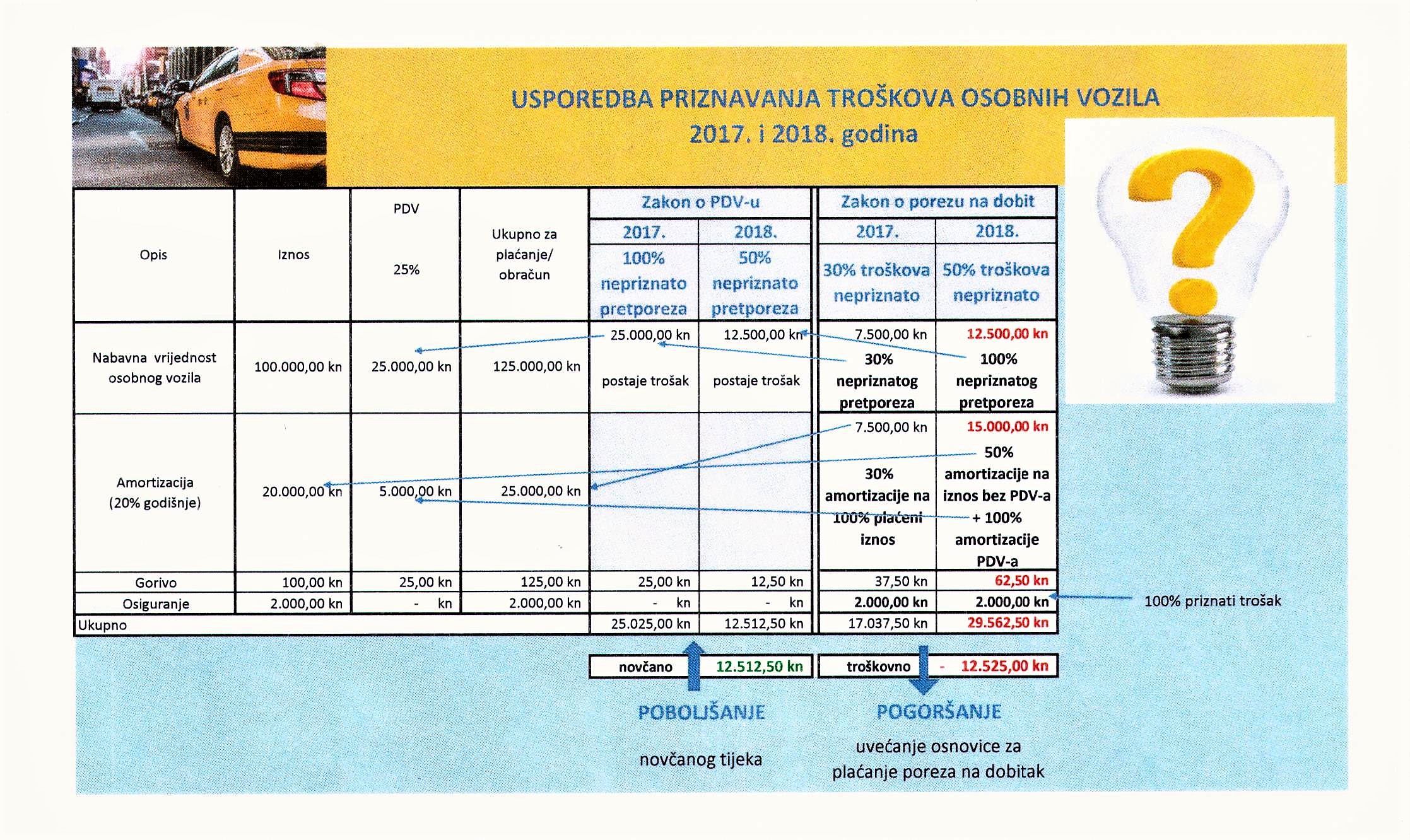 We already wrote about the costs of personal vehicles in our Blog from 2017. year, but given the changes since the beginning of 2018. year, as well as the constant topicality of the topic in Croatia, we look again at the news.
We already wrote about the costs of personal vehicles in our Blog from 2017. year, but given the changes since the beginning of 2018. year, as well as the constant topicality of the topic in Croatia, we look again at the news.
FromJanuary 1st 2018 a deduction of 50% of input tax (VAT) is allowed on input invoices related to the costs of using private cars used for personal transportation. However, even though it looks great, considering that previously the input tax could not be deducted in its entirety, the relationship between tax recognized and non-recognized expenses has also changed from the point of view of profit tax, unfortunately to the detriment of entrepreneurs, i.e. a smaller percentage of expenses is tax recognized.
When using private cars for personal transport, as well as other means used for personal transport, there are costs that need to be distinguished from the point of view of the Income Tax Act according to their impact on the tax base. Namely, all costs that occur when using private cars for personal transport are not fully tax-deductible costs.
Considering that from 1. January 2018 can deduct 50% of the input tax (VAT), so the unrecognized input tax becomes an expense, the question of the tax position of the unrecognized input tax (VAT) arises. According to the provisions of the Income Tax Act, and according to the available interpretations of the Ministry of Finance – Tax Administration, the amount of unrecognized input tax represents an unrecognized expense. This means that the amount of unrecognized input tax is added to the unrecognized amount of the cost (50% of the cost + 50% of the unrecognized input tax). Namely, in the Income Tax Act, it is stated that costs related to vehicles include costs with associated VAT, according to the status of the individual vehicle:
1. for vehicles owned by the taxpayer, the costs of fuel and oil, maintenance and repairs, registration and depreciation,
2. for the rent-a-car service, the calculated fee plus fuel costs,
3. for leased vehicles, compensation according to the contract, the cost of fuel and maintenance and all other costs borne by the lessee under the lease agreement, and in the case of a financial lease, the cost of depreciation.
The costs for which the tax base is increased, according to the Profit Tax Ordinance, do not include insurance costs, interest related to the purchase of a vehicle and paid tax on road motor vehicles, as well as fees and charges that, according to special regulations, are paid when registering a vehicle for personal transport.
According to the Income Tax Act, the COSTS OF USING PASSENGER VEHICLES can be divided into:
A) 50% RECOGNIZED COST
- depreciation (on purchase value up to HRK 400,000.00),
- fuel and oil,
- vehicle maintenance and repair,
- vehicle registration and technical inspection,
- vehicle service,
- car tires,
- vehicle washing, etc.,
- rent-a-car service increased for fuel costs,
- the cost of compensation under the contract (rental vehicle) and all costs borne by the lease user under the contract.
B) 100% RECOGNIZED COST
- paid tax on road motor vehicles,
- interest on credits and loans for financing the purchase of a vehicle,
- compulsory insurance,
- comprehensive insurance,
- fees and charges that must be paid when registering a vehicle.
C) 100% UNRECOGNIZED COST
- depreciation of 50% of unrecognized input tax,
- depreciation of 100% of unrecognized input tax,
- depreciation of the purchase value above HRK 400,000.00.
D) IF THE SALARY IS CALCULATED ON THE BASIS OF THE USE OF PERSONAL VEHICLES, ALL COSTS ARE RECOGNIZED IN FULL, except for depreciation on the purchase value above HRK 400,000.00, i.e. if salary in kind is calculated, depreciation of 50% of unrecognized input tax is a recognized expense, and depreciation of 100% of unrecognized input tax is an unrecognized expense.
Depreciation of a personal car is also included in the expenses for which the profit tax base is increased (50% of the cost value). Depreciation of passenger cars is calculated at the cost of acquisition using annual depreciation rates. The annual depreciation rate for passenger cars according to the Income Tax Act is 20%, i.e. the highest accelerated allowed rate is 40%. An entrepreneur can also make a decision to apply rates that are lower than those prescribed, but in practice this is very rare. Depreciation of passenger cars starts to be calculated from the first day of the month following the month in which the entrepreneur started using the vehicle. When calculating the depreciation of vehicles used for personal transportation, their value is important. Namely, when it comes to cars and other means of personal transportation with a purchase value above HRK 400,000.00, in accordance with the Law on Profit Tax depreciation of the purchase value above HRK 400,000.00 is not recognized. The unrecognized amount of input tax (VAT) on the purchase value above HRK 400,000.00 has the same tax position. Given that when purchasing a car, 50% of the unrecognized input tax on the purchase value of up to HRK 400,000.00, or 100% of the input tax on the purchase value of a vehicle above HRK 400,000.00, should be reported on separate accounts, the sums thus reported are subject to depreciation.
In life, you always gain something, only to lose something, and so it is in business: the legislators allowed us to use the input tax in its entirety, and this is “shouted on everyone’s lips”, but at the same time, there is silence about the reduction of the tax-deductible cost and, consequently, a larger basis for paying taxes on gain. Not to mention additional records in the VAT form, with the purpose of monitoring by the Tax Administration how much input tax we have used based on the costs of personal vehicles.
All in all, not everything is as it seems and advertised at first glance.
For more detailed explanations, advice and opportunities in your business, feel free to contact us!
Best regards until the next meeting!
